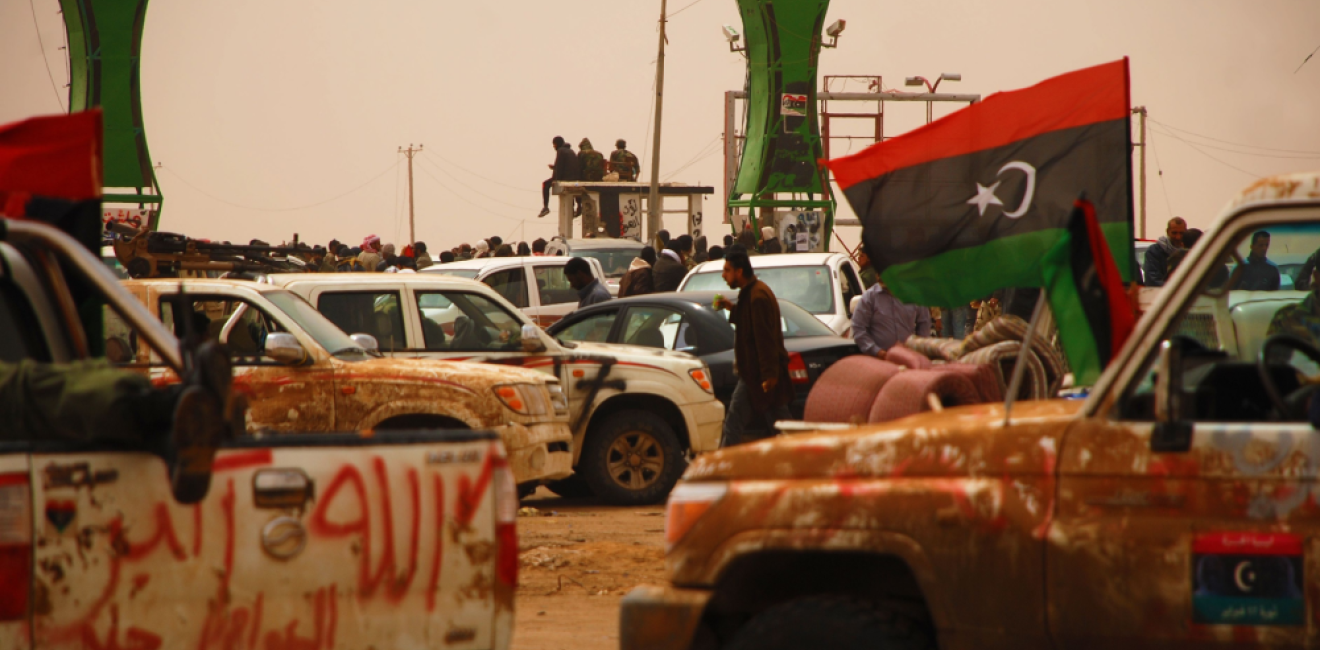
A blog of the Africa Program
Militias saturate Libya. Since the 2011 February Revolution toppled Muammar Gaddafi and instigated a bloody civil war, Libya has been in perpetual insecurity. The fight against Gaddafi led to the formation of a multitude of militias, many of which still exist today. The rise of the Islamic State (IS) and its Libyan affiliate further exacerbated the security struggles. They contributed to militias’ growth and power in influence across the country as they were the primary actors responsible for driving IS out of its strongholds. Since, these militias have slowly integrated themselves into the country's political, economic, and security sectors. Two rival governments currently vie for control of Libya—the Government of National Unity (GNU) in the western region and the Government of National Stability (GNS) in the eastern region. Both governments have affiliated militias that receive state funding and employ thousands of Libyans. While these armed groups largely comprise the security apparatuses for major cities such as Tripoli and Benghazi, the main thing they secure is a future of continued insecurity under the ever-present threat of violence.
In eastern Libya, the Libyan Arab Armed Forces (LAAF) (also called the Libyan National Army [LNA]) under the control of Khalifa Haftar has the greatest influence. The LAAF is a hybrid armed actor with multiple militias in alliance under its heading. It is also nominally affiliated with the GNS. While the militias loosely align themselves under Haftar, many of them operate largely on their own. They engage in security raids against drug traffickers, migrant hideouts, and criminal activities as well as deploy troops as needed to conduct security patrols in eastern Libya.
In western Libya, especially in the region surrounding Tripoli, there are dozens of influential militias. Some of the most prominent militias are the Stability Support Apparatus (SSA), Misrata Counter Terrorism Force (CTF), Rada Special Deterrence Forces (SDF), 444 Brigade, Nawasi Brigade, Joint Operations Force (JOF), and 111 Brigade. Some of these militias are aligned with the GNU, while others align with the GNS. The alliances are loose and can change over time. These militias conduct many official, state-sanctioned activities such as arrests, detentions, surveillance, intelligence, street patrols, border security, and running migrant camps.
Civilians strongly desire security and have appeared willing to overlook criminal activity for the promise of security and infrequent violence.
Although responsible for security, militias throughout Libya regularly clash, contributing to an unstable security environment. In August 2022, GNU militias clashed with GNS militias in Tripoli. The fighting killed at least 32 people. In 2023, there have been over ten documented clashes. Notably, fighting between the First Support Battalion and SSA killed at least four individuals in Zawiyya in late April, and conflicts between numerous Zawiyyan militias killed two and injured at least a dozen others in mid-May. Additional documented clashes occurred in Tripoli, al-Ajilat, Qasr bin Ghashir, Tajoura, and Ben Ashour.
Not only do their activities result in loss of life, but the militias have also been accused of human rights abuses. A UN report from the Independent Fact-Finding Mission on Libya published in March 2023 accuses militias of committing the equivalent of war crimes, including arbitrary detentions, enslavement, murder, rape, and enforced disappearances with impunity. Amnesty International reports individuals and groups guilty of war crimes have been integrated into state institutions. Their 2022-2023 International Report accuses militias, including the LAAF, SSA, JOF, and SDF, of committing crimes such as arbitrary detentions, abductions, beatings, mock executions, waterboarding, sexual violence, and restricting freedom of association and expression. They report neither the GNU nor GNS has made efforts to stop these abuses, instead continuing to fund militias and appoint militia leaders to positions in the government.
Despite the clashes and reports of human rights abuses, militias have found ways to thrive in Libya. Civilians strongly desire security and have appeared willing to overlook criminal activity for the promise of security and infrequent violence. The sporadic violence of clashes helps militias justify the security they provide. The militias exploit the country's ongoing political, social, and economic crises, increasing their legitimacy and influence. Civil war victories and counterterrorism and counter-crime successes allowed militias to sell themselves as superior to other security forces. They now have a steady stream of members because militias represent their only option to earn an income for many individuals in Libya. Their government labels allow them to openly recruit with government approval. With profits from the state and from smuggling, militias can wield nearly unchallengeable influence in their areas of operation.
There are multiple paths forward for the future of militias in Libya. One path could be to continue as is with militias maintaining dominance in the political and security sectors. A second path would be a centralized approach to disarmament, demobilization, and reintegration (DDR) and security sector reform (SSR). This path likely depends on the fate of elections, which are a point of major contention in Libya, postponed in December 2021 and yet to occur. A unified Libyan government would have the greatest chance of changing the role of militias in society from a national level by potentially buoying efforts to establish a unified military institution that could absorb and replace the role of militias. This process carries risks and difficulties, including tensions between militias, biases of militias towards different political factions, and the possibility of creating further unbalanced civil-military relations.
An alternative approach would be to address DDR and SSR at the local level. Communities could develop approaches specific to their areas' context, allowing progress to continue even if politics at the national level face struggles. However, a local approach would need an overarching strategy across the country, or it runs the risk of being inconsistent and exacerbating tensions. Other options to address militia’s impunity include:
- adopting criminal accountability at both the local and national level
- strengthening the capacity of the Libyan judiciary
- releasing arbitrary detainees
- dismantling secret prisons
The international community can also play a role in the future of militias in Libya. One way is through funding. Groups providing money to Libya for migrants, such as the EU, can work to ensure the money goes towards helping migrants and not funding militias and the migrant camps they run. They can engage in more oversight of funding destinations and camps, and they could consider cutting funds if certain conditions are not met. Countries known to fund militias in the past, including Russia, Turkey, Egypt, Syria, and the UAE, could consider be more intentional with what they provide funding to be used for. These countries can reevaluate and restructure their policies to ensure the funding supports Libyans and does not perpetuate violence. They can set standards groups must meet to receive funds and stop funding when necessary. Alternatively, international institutions and other actors could police funding and support given to militias and sanction individuals, militias, or states as necessary.
A second way the international community can play a role in the future of militias is through assistance in creating alternative livelihoods for Libyan citizens through the provision of financial and educational tools for both private and public sector development. New options for income may draw individuals away from militias and lessen their sway. However, international activity will play a supporting role in domestic approaches, as Libyan actors are ultimately the ones with the ability to determine the future of militias in their state.
Addison Emig was the Staff Intern with the Stafford Capacity Building Internship at the Wilson Center Africa Program for the Summer 2023 term.
The opinions expressed on this blog are solely those of the authors. They do not reflect the views of the Wilson Center or those of Carnegie Corporation of New York. The Wilson Center’s Africa Program provides a safe space for various perspectives to be shared and discussed on critical issues of importance to both Africa and the United States.
Author


Africa Program
The Africa Program works to address the most critical issues facing Africa and US-Africa relations, build mutually beneficial US-Africa relations, and enhance knowledge and understanding about Africa in the United States. The Program achieves its mission through in-depth research and analyses, public discussion, working groups, and briefings that bring together policymakers, practitioners, and subject matter experts to analyze and offer practical options for tackling key challenges in Africa and in US-Africa relations. Read more

Explore More in Africa Up Close
Browse Africa Up Close
The Innovative Landscape of African Sovereign Wealth Funds



